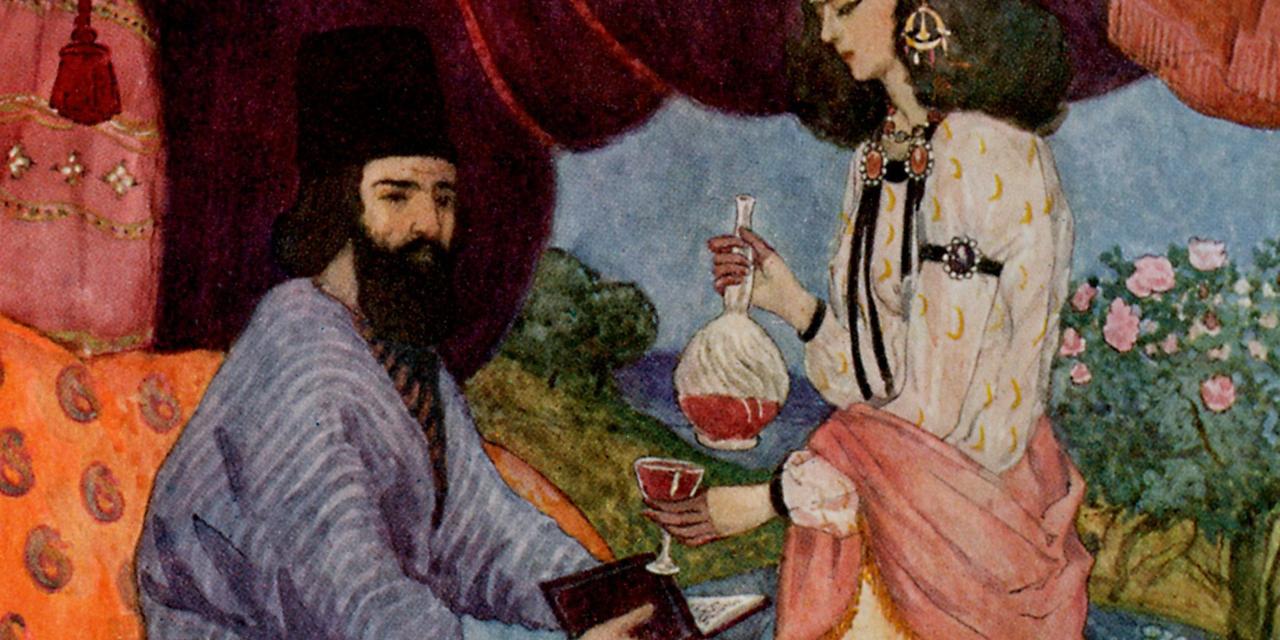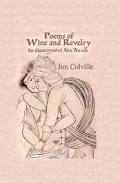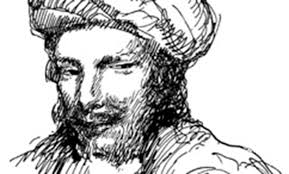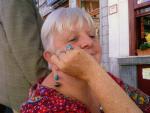|
Een Nederlandse jongedame, met de heerlijke naam Desirée, is studente Arabistiek aan de KU Leuven. Ze gaat dit jaar voor haar Master Arabische en Islamitische studies en behaalde reeds een MA in Internationale Politieke- en Conflictstudies in Leiden. Morgen precies (2 oktober) vertrekt ze voor drie maanden naar Jordanië op stage. Haar onderwerp is de waterhuishouding daar, hoe water verspreid wordt en efficiënt beheerd, want water is schaars in woestijnlanden. Beetje een ecologisch thema.
Zij heeft een gedicht van mij in het klassiek Arabisch vertaald, ik schreef een (instant)gedicht voor haar over haar reis met vriendin Onna naar Cyprus. Wij zijn op dit ogenblik goede vriendinnen. Deze gedichten staan op mijn blog https://onbedaarlijkbordeaux.blogspot.com/ zie Arabische stemmen en die dag in de springerige lente.
Op haar blog https://issabramil.wordpress.com/ schrijft zij frisse en progressieve stukjes over de Arabische wereld. Arabieren hebben een fout imago. Wij kennen deze culturen alleen maar uit de oorlogsverslaggevong, de vluchtelingencrisis, het hoofddoekendebat, de zgn fanatieke islam enz... Met haar opstelletjes bewijst D. dat ook een moderne en progressieve wind kan waaien over de woestijnen van Arabië. Dat mensen, jongeren vooral, over de hele wereld dezelfde dromen en betrachtingen hebben.
Zelf benader ik een cultuur altijd literair en muzikaal. Niets zaliger dan op hete zomerdagen te luisteren naar klassieke Arabische muziek, een schaal met druiven en dadels en vijgen en mierzoete gebakjes en geurige muntthee binnen handbereik.
Maar zeker op hun literaire erfenis kunnen Arabieren trots zijn. 'Elke Arabier is een dichter', zei Rodaan Al Galidi in oktober 2017, tijdens het evenenement Arabische stemmen in Mechelen. (zie https://onbedaarlijkbordeaux.blogspot.com/)
Ik publi hier enige gedichten van de beroemde en beruchte dichter Abu Nuwas (achtste eeuw!), als voorsmaakje. In een volgende bericht mijn vertaling van het artikel van DC.
Deze gedichtne lees ik als 'gewone' liefdesgedichten, zij staan bijna helemaal los van gender en culturele achtergrond. Ze zijn uniuverseel.
In The Bath-House
In the bath-house, the mysteries hidden by trousers
Are revealed to you.
All becomes radiantly manifest.
Feast your eyes without restraint!
You see handsome buttocks, shapely trim torsos,
You hear the guys whispering pious formulas
to one another
('God is Great!' 'Praise be to God!')
Ah, what a palace of pleasure is the bath-house!
Even when the towel-bearers come in
And spoil the fun a bit.
Don'T Cry For Layla
Don't cry for Layla, don't rave about Hind!
But drink among roses a rose-red wine,
A draught that descends in the drinker's throat,
bestowing its redness on eyes and cheeks.
The wine is a ruby, the glass is a pearl,
served by the hand of a slim-fingered girl,
Who serves you the wine from her hand, and wine
from her mouth — doubly drunk, for sure, will you be.
Thus I am drunk twice, my friends only once:
a favor special, for me alone!
Love In Bloom
I die of love for him, perfect in every way,
Lost in the strains of wafting music.
My eyes are fixed upon his delightful body
And I do not wonder at his beauty.
His waist is a sapling, his face a moon,
And loveliness rolls off his rosy cheek
I die of love for you, but keep this secret:
The tie that binds us is an unbreakable rope.
How much time did your creation take, O angel?
So what! All I want is to sing your praises.
Abu Nuwas



Abu Nuwas
756–814
Abu Nuwas (Abu Ali al-Hasan ibn Hani al-Hakami) was born around 760 in southwestern Persia, now a borderland between Iran and Iraq. He studied in Basra under the mentorship of the poets Abu Usama Waliba ibn al-Hubab al-Asad and Khalaf al-Ahmar, and spent his adult life in Baghdad.
Abu Nuwas was one of the most important poets of 8th-century Islamic world. He is perhaps best known for his khamriyyat (wine poems). His collected poems, or Diwan, includes around 1,500 works that explore pleasure, sexuality, especially homosexuality, and religion.
Nuwas died in Baghdad around 814.
Bronnen:
https://www.poemhunter.com/abu-nuwas/
https://nl.wikipedia.org/wiki/Abu_Nuwas
https://issabramil.wordpress.com/
|




